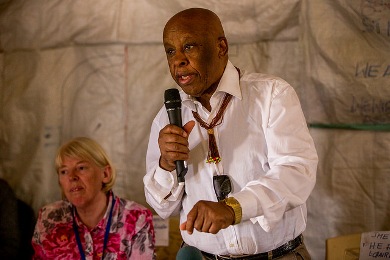Top peace monitor says people starve to death in South Sudan’s Mundri county
February 02, 2016 (JUBA) – People are starving to death in Mundri county of the newly created Amadi state in South Sudan according to the report by the Joint Monitoring and Evaluation Commission (JMEC), a body monitoring the implementation of the peace agreement signed in August last year.

“I was told this morning that one of the ceasefire monitoring teams, which recently visited Mundri, found people there are starving to death,” said Mogae.
Mogae expressed “disappointment” that the parties have failed to form a transitional government of national unity (TGoNU) last month.
“Disappointed that I am not here today to see a new transitional government in place. Disappointed that another date has come and gone. This disappointment stems not solely because a day on a calendar was missed, but because the potential, the opportunity, the possibility of a new government is so close, so vital for this country, that it must be taken,” he said.
“Every day we spend here I think of the children I met growing up without the chance of education, the chance of bettering their own lives denied through no fault of their own. When will independence make a difference for these people? For all of your people? Africa has too many lost generations already,” he added.
According to JMEC timetable, TGoNU should have been formed on January 22. The parties missed the deadline after disagreeing on number of states. Intergovernmental Authority on Development (IGAD) council of ministers urged the parties to form TGoNU this week and resolve the issue of 28 states later.
President Salva Kiir created the new states in October, two months after signing the peace agreement. Mogae said the economic situation is worsening and there is need to save lives.
“When I left South Sudan in January, the South Sudanese pound was under 20 to the dollar. Today, I am told, it is close to 30. As a former central bank governor, as a former official at the IMF, I know how difficult it is for the economy to be managed in unstable times. But I plead with you to avoid ruin: form the transitional government of national unity without further delay, restore stability, repair the damage that has been done before it is too late, so that urgent economic assistance can become available,” he said.
Prices of basic commodities surged since the central bank and finance ministry devalued the South Sudanese pounds against the United States dollar.
Mogae said he expected parties in the meeting on Tuesday to take practical and immediate action to complete the tasks necessary to establish a new government, to agree on the urgency of introducing phased arrangements for the transitional security arrangements necessary for the capital city, Juba.
The interaction also discussed how the work of the other transitional security institutions can be accelerated and to identify, further to previous commitments, any additional steps that can be taken by the Parties to ensure constraints on humanitarian access are removed.
“I expect to report again to the AU Peace and Security Council, and to the UN Security Council on the status of implementation of the Agreement within weeks. I hope my next report can be more positive than my last, and that the delays that have plagued the process so far cease,” he said.
(ST)
